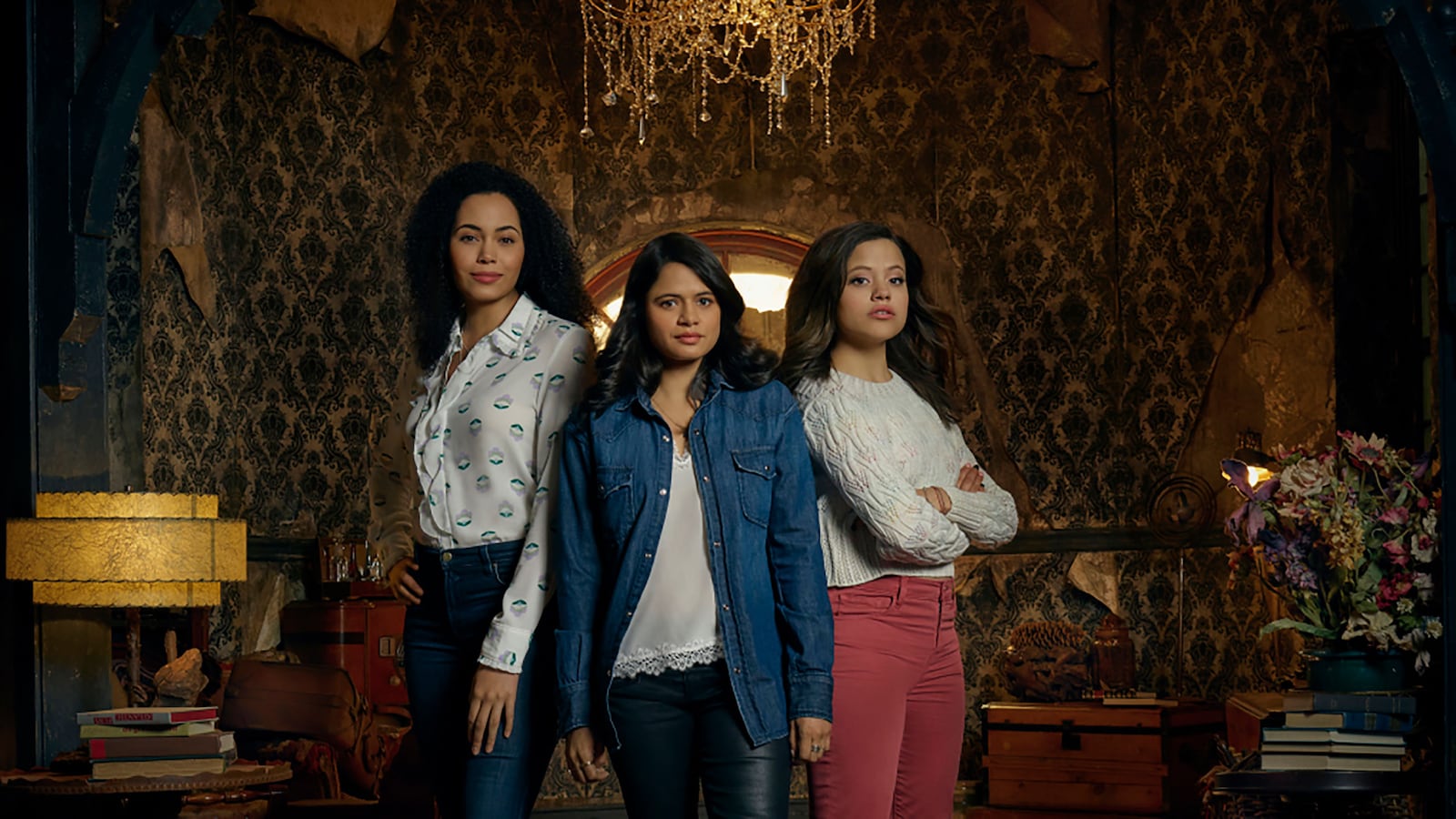“This is not a witch hunt,” says an exasperated Marisol Vera (Valerie Cruz) in the first episode of the Charmed reboot, echoing a frustration felt by many in recent months when accused sexual abusers claim to be persecuted by court proceedings or public backlash.
Marisol, a women’s studies professor at a university in fictional Hilltowne, Michigan, is discussing an all-too-familiar situation: the case of a colleague, Professor Taine, who’s been accused of sexual assault by multiple women. Using the term “witch hunt”—which once referred to the murder of supposed witches in the Middle Ages but now is often appropriated by alleged abusers of all kinds—in a show about actual witches is a clever way to unite the dialogue surrounding an accused sexual abuser with the show’s protagonists, who are indeed witches, though not in the traditional sense.
Marisol has three daughters: Melanie or “Mel” (Melonie Diaz), an outspoken feminist and activist, and her younger sister Maggie (Sarah Jeffery), who’s more into parties than politics. After their mother’s mysterious death, some weird shit starts going down and Mel and Maggie soon find out they have a half-sister, the brainy scientist and grad student Macy (Madeleine Mantock).
As with the Halliwell sisters of the original Charmed, all three sisters are unaware of their witchy heritage until Macy’s arrival activates the “power of three” that unleashes their supernatural abilities. Like the original three, their powers include telekinesis (Macy’s power) and the ability to freeze time (Mel’s power). But that’s where most similarities between the two series end. Instead of having the power of premonition like Phoebe Halliwell (Alyssa Milano), Maggie instead has the ability to read minds—a useful, if awkward power for a college freshman and would-be sorority girl. The show’s newest iteration takes place in Michigan, not early-aughts San Francisco, and perhaps most importantly, all three sisters (and the actors portraying them) are of Latinx or Afro-Caribbean descent—a refreshing update to the lily-white Halliwell sisters, immortalized by Shannen Doherty, Holly Marie Combs, and Milano in the original series.
The new Charmed also has a decidedly political, pro-women bent. Seeking to embarrass Maggie at a party, Mel loudly proclaims how she might “engage these young men in discussions of consent,” and later reminds a woman making out with a man on the couch, “you can change your mind at any time!” Mel’s zero-tolerance approach to rape culture is played for laughs in this case, but the rest of the episode contains a multitude of feel-good feminist moments that lend the show an earnest, if occasionally overblown political edge.
Indeed, the first episode’s plot seems ripped from the headlines; the sexual-assault scandal quickly takes a familiar turn, as the accused university professor is quickly acquitted via an internal hearing and reinstated to his position—despite witness testimony that suggests he’s a sexual predator. This galvanizes Mel, a graduate student at the university, to plaster flyers reading “Rally for what’s right! Time’s Up!” across campus, earning the ire of several MRA sympathizers and the attention of a professor, Harry Greenwood (Rupert Evans), who replaced her mother as head of the women’s studies department after her death.
Mel’s contempt with Greenwood (“They should’ve never hired a cis male to lead the women’s studies department,” she snarls when he introduces himself) only mellows when he reveals himself to the sisters as their “whitelighter,” a guide and protector of witches. He tells Mel, Macy, and Maggie that the apocalypse is nigh, pointing to three signs indicated by “ancient oracles” in Marisol’s Book of Shadows (think of it as a spellbook and witchy encyclopedia combined). The first sign, Greenwood says, is “when the weakest of men reaches ill-gotten glory.” In case the parallels to our current political climate weren’t clear, Greenwood elaborates: “Suffice to say, it’s your current president.” While Marisol’s death also portends the end of the world, the sisters still have a chance to defeat evil and prevent the apocalypse—that is, if they collectively accept their destiny as witches. “Being a witch is a fully pro-choice enterprise,” Greenwood tells the sisters, in one of the show’s more cringey attempts to integrate 2018-appropriate wokeness.
Evil in this case is the aforementioned Professor Taine, a predator in more ways than one—aside from being a sexual abuser, he also turns out to be an ancient demon. After a botched first attempt and a case of mistaken identity, Macy and Maggie finally realize who their target is, and rush to campus to defeat him. Mel, meanwhile, is already there protesting Taine’s reinstatement, unaware he is a predator of truly monstrous proportions.
The on-campus protest scenes call to mind recent demonstrations against Kavanaugh’s confirmation, and the multitude of other protests this year alone that have sought to call out predatory men. Chants of “We believe the women!” and clever signs denigrating the patriarchy make the episode’s protest scenes feel all too real. Embracing their status as powerful witches, the sisters confront Taine in his lab and band together to defeat him. All is well, at least for now.
After discussing whether they should wipe the memory of a creepy men’s rights activist and Taine supporter named Cam who witnessed the whole fight, the sisters, along with Greenwood, decide against it. “Let him tell people,” Mel says smugly. “No one would believe another hysterical man.” Macy agrees. “It’s a he said/she said situation.”
It’s a defiantly feminist tone, one that subverts the language traditionally used to demean sexual assault victims and instead turns it against a would-be aggressor. And while the ending may seem a bit too on-the-nose, it’s a natural conclusion for an episode—and a series—focused on calling out gender norms and highlighting the more insidious aspects of rape culture.
The stars of the original Charmed have voiced their disappointment with the reboot. Combs, who played middle sister Piper Halliwell in the original iteration, said in a statement that while she appreciates the jobs the Charmed reboot created, “I will never understand what is fierce, funny, or feminist in creating a show that basically says the original actresses are too old to do a job they did 12 years ago.” Doherty, who played Prue Halliwell, expressed similar opinions. But Milano—seen recently at the Kavanaugh hearings—took a more diplomatic approach: “I wish that they would have come to us and we would have been involved since the beginning,” she said to Entertainment Tonight. “But having said that, I do hope that it reaches the newer generation and impacts that generation the way ours was able to do for its generation.”
If the first episode of the Charmed reboot is any indication, the series is taking its duties as a feminist witch story for a new generation very, very seriously. That’s not to say that there are no funny, enjoyable moments—Evans’ dryly humorous turn as Harry Greenwood ensures that there are. Rather, it’s refreshing to see a show so focused on portraying the female experience (through Latinx protagonists, no less) with a campy supernatural twist. The Charmed reboot is indeed funny and fierce, with a political edge that places the show firmly in 2018.
But you don’t have to be a witch to identify with the Vera sisters, as Mel so deftly explains when trying to convince her sisters to accept their destiny as witches: “Throughout history strong women were called witches,” she tells them. “And they are. We are.”





